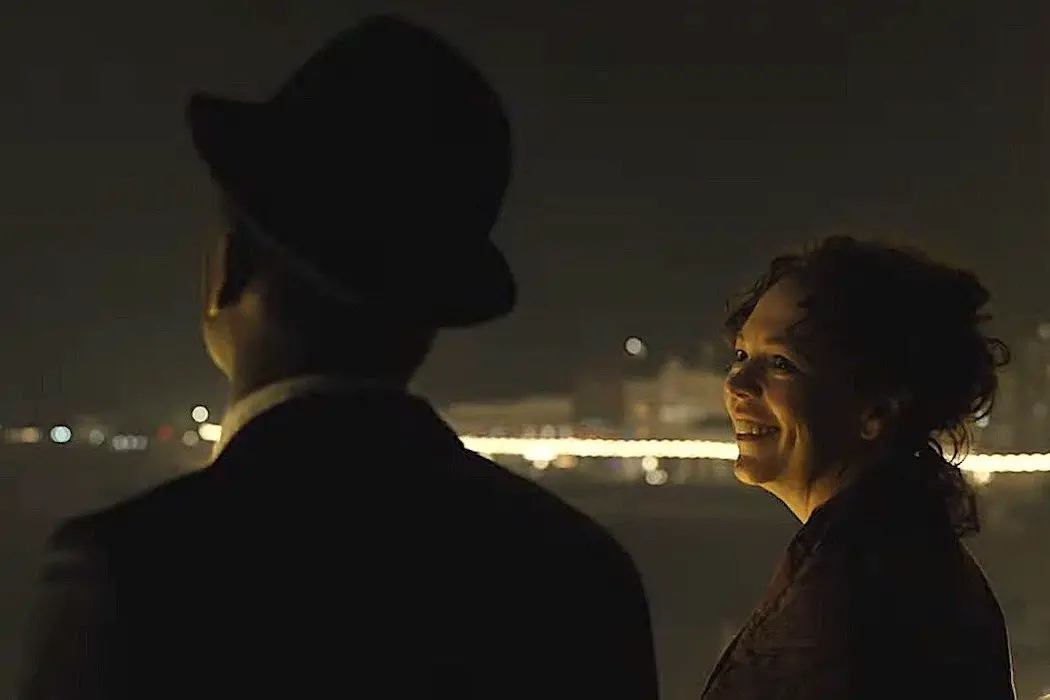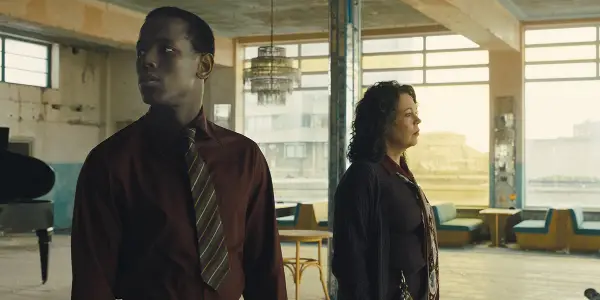Toronto International Film Festival 2022: EMPIRE OF LIGHT: Portrait Of A Theater By The Coast

Kevin L. Lee is an Asian-American critic, producer, screenwriter and…
Portrait films are tricky. Instead of a story built on conflict and turning points, portrait films prioritize the capturing of mood, a time, and a place. This could not be more true with Empire of Light, a beautiful albeit frustrating case study of Sam Mendes the director vs. Sam Mendes the writer.
Establishing the Mood and Atmosphere
From the opening credits, Mendes sets the tone and headspace for us. As spoken before multiple times, he has stressed the importance of cinema and his fear of what could happen to movie theaters in a post-pandemic world. With that atmosphere and emotional limbo in mind, we can come to appreciate the opening scenes, as we see Hilary (Olivia Colman) come to work. She is the manager of the Empire theater, located by the coast. It’s an empty, quiet little space, but it’s good. Few customers come in every once in a while to see a movie, and Hilary is there along with her coworkers to greet everyone.
But we can sense immediately that she’s not happy. She doesn’t spend time with her co-workers outside of work, and the work atmosphere is often marred by emotionless sex with her boss (a unique role by Colin Firth). Soon, the arrival of a new employee named Stephen (Micheal Ward) changes everything, as he ignites a spark in Hilary and the two begin a romantic relationship.

From this point on, Empire of Light attempts to balance every narrative thread. We are reminded of the time period the film takes place in, that of the 80s when people who look like Stephen are relentlessly pursued. With that, Mendes explores the tension between Hilary and Stephen as they are forced to keep their relationship a secret from everyone else.
Using Technical Prowess to Capture Drama
On a technical level, this struggle is captured with an admirable sensitivity – Colman and Ward both nail the body language that hints at the rift between. The emotions in each scene can also be felt by Roger Deakins’ choice of camera position, blocking, and framing, along with a delicate score by Trent Reznor and Atticus Ross. However, on a writing level, the film doesn’t have enough drama happening.
Mendes combines the “forbidden romance” between Hilary and Stephen and tries to juggle that with the historical backdrop they are in. If that’s not enough, he complicates the film with another story thread about Hilary’s history of mental illness. They are suddenly thrown into the narrative with little introduction or resolution, and even when Colman demonstrates an exceptional range of anger, frustration, desperation, and heartbreak, the film never quite works on a dramatic front.
Admittedly, the film carries plenty of effective scenes. Toby Jones is excellent as the theater’s projectionist, and a scene between Ward’s Stephen and a racist audience member is undoubtedly a highlight. But as a whole, the film struggles to pinpoint a single thread or emotional throughline that connects everything together in a cohesive manner. Had the film been solely about Hilary’s mental illness or solely about racism in the 1980s, the film would’ve benefitted from having a stronger focus and story engine.
We Come Back to the Writing
With the exception of Jones’ projectionist talking about the magic of 24 frames per second and how the projectors work, nobody else in the theater’s working staff shows an interest in seeing films. Sure, Stephen inspires Hilary to experience cinema, but the rest of the theater staff remains indifferent. Later on in the film, as it approaches its third act, the script introduces two new characters, that of Stephen’s mom (Tanya Moodie) and new girlfriend (Crystal Clarke). We even get to spend some time in his house, giving us intimate access to his own personal family struggles – it’s all well-acted and presented, until you start thinking about how the film should’ve incorporated all of this from the very beginning, to let Stephen be his own protagonist.

Mendes has talked about how we are living in cynical times, and for that, he made a film that he wanted to be authentically uncynical. I can gladly say that on that front, he has indeed succeeded. His handling of directing actors and blocking in a dramatic scene are still ever-present in Empire of Light. Not many directors working today have the ability to handle both dialogue scenes and large epic sequences. There is also much to admire and respect about Mendes deciding to completely scale back on this project – it’s his smallest film since he was given the reins to James Bond. But it is so clear in the writing on what he wanted to prioritize.
Empire of Light: Beautiful Display of Filmmaking That Could’ve Been More
Empire of Light is clear on what Mendes wants us to feel, but it isn’t clear on what Mendes wants to say to us. The film always shines on a technical level, capturing a period of civil unrest while merging it with an overwhelming sense of nostalgia and love for an art form to help us escape to a magical place. I just wish that a more experienced screenwriter worked on this project with him, to help his beautiful sensibilities be carried by a stable story foundation underneath.
The result is a beautiful-looking film that could’ve been so much more personal had it not been for a script that’s trying so hard to juggle so many threads and ideas together in one. With a lack of dramatization in the story, the film only has its fantastic performances and technical components to keep it afloat.
What did you think of Empire of Light? Let us know in the comments below!
Empire of Light premiered on September 3, 2022 at the Telluride Film Festival. Searchlight Pictures will release the film in US theaters on December 9, 2022.
Watch Empire of Light
Does content like this matter to you?
Become a Member and support film journalism. Unlock access to all of Film Inquiry`s great articles. Join a community of like-minded readers who are passionate about cinema - get access to our private members Network, give back to independent filmmakers, and more.
Kevin L. Lee is an Asian-American critic, producer, screenwriter and director based in New York City. A champion of the creative process, Kevin has consulted, written, and produced several short films from development to principal photography to festival premiere. He has over 10 years of marketing and writing experience in film criticism and journalism, ranging from blockbusters to foreign indie films, and has developed a reputation of being “an omnivore of cinema.” He recently finished his MFA in film producing at Columbia University and is currently working in film and TV development for production companies.













